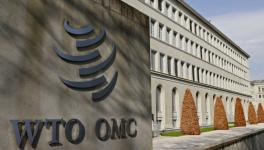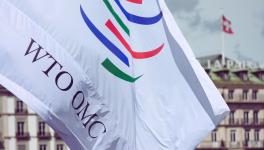Free Trade Agreements: The Dangerous New Frontier
A major driver of the proliferations of regional and bilateral trade agreements has been the perceived failure of the WTO to govern global trade. This, in large measure, has been a consequence of the intransigence of the powerful trading blocs (the US, EU, Japan, etc) to accommodate the legitimate concerns of developing nations and also because of differences between the EU and the US in some major areas (especially related to agricultural subsidies). As a result, ever since the WTO ministerial meeting in 1999 in Seattle, virtually every WTO ministerial meeting has concluded without a clear road map. The other driver of the new bilateral and regional agreements is the perception in developed countries that they need to go beyond the WTO agreement and ratchet up the demand for binding commitments from developing countries.
HOW THE US & THE EU VIEW FTAs
The history of the negotiations in GATT (General Agreement on Trade and Tariff – the precursor to the WTO), which led to the formation of the WTO, shows how the US has always combined negotiations in multilateral and bilateral fora, in order to ensure that their writ finally prevails. For example, during the 1980s the US set the scene for the inclusion of an agreement on intellectual property in the Uruguay Round of GATT negotiations (1986 – 1994) through a series of strategic bilateral negotiations on intellectual property with countries like Brazil, Singapore and South Korea. The purpose of these was to break the resistance of those developing countries that were leading the opposition to the US agenda on intellectual property within the Uruguay Round of negotiations, as well as to set precedents for the kind of standards that the US wanted to see included in a multilateral agreement (in the WTO) on intellectual property.
In the US, the Trade Promotion Authority Act of 2002 directs the USTR (US trade representative) to seek to ensure “that the provisions of any multilateral or bilateral trade agreement governing intellectual property rights that is entered into by the United States reflect[s] a standard of protection similar to that found in United States law”. Clearly, thus, what is demanded of by the US in FTAs as regards IPR is informed by the domestic laws of the US and not by the internationally negotiated TRIPS Agreement.
The EU has been no less explicit regarding its intentions. In October 2006 the EU commission launched its new trade policy called “Global Europe – competing in the world”. The policy is designed to increase competitiveness of European corporations, with an evocative slogan coined by then EU trade commissioner, Peter Mandelson: ‘Big in Europe, big in the world’.
As part of this strategy the EU’s trade policy plans to aggressively advance issues which they have not been able to pursue adequately in the multilateral forum of the WTO. The new policy foregrounds five major areas :
Market access for European business through elimination of tariff and non-tariff barriers;
- the so-called Singapore issues (investment, government procurement, competition and trade facilitation) which were rejected in the Cancun WTO ministerial meeting of the WTO in 2003 by a combined front put up by governments of developing countries;
- intellectual property rights (IPR),
- the service sector which is a stronghold of the EU economy;
- reference to sustainable development including rhetoric about social and environmental standards, core labour rights and decent work (which are euphemisms used to put at a disadvantage enterprises located in developing countries).
CO-EXISTENCE OF FTA & WTO
There is a curious story which explains how FTAs and the WTO exist side by side. The cornerstone of the WTO is the most-favoured-nation (MFN) treatment among the member-countries. This clause means that member countries of the WTO cannot discriminate in their treatment of other member countries, ie, in any WTO member country, all WTO member countries (operating through corporations, etc located within their territories) would be provided with the same facilities and be subject to the same rules. Logically, this should bar all FTAs, because these agreements can have provisions that are different from the WTO and thus do discriminate between countries who are part of an FTA and those who are not (even if both sets are members of the WTO). The catch lies in the fact that when the WTO agreement was signed in 1994, many countries were already bound by bilateral agreements that eliminated customs related regulations between contracting parties. Thus the WTO agreement issued a waiver on “custom unions’, taking recourse to Article 24 (8b) of GATT), which says: “A free-trade area shall be understood to mean a group of two or more customs territories in which the duties and other restrictive regulations of commerce (…) are eliminated on substantially all the trade between the constituent territories in products originating in such territories.”
While FTAs today use the cover of this waiver, substantive parts of almost all FTAs have very little to do with customs regulations, but deal with other aspects of global trade (for example Intellectual Property Rights are not part of customs related issues).
IMPACT ON HEALTH
The TRIPS agreement, under the WTO, sets minimum standards for IP protection that all member states are required to adhere to. There were however partial waivers for developing and least developed countries. Developing countries (such as India, Brazil, Thailand, etc) were allowed a transition period of 10 years and they were required to comply with the TRIPS agreement only by 2005. LDCs had a further grace period and are required to comply only by 2013 (2016 in the case of pharmaceuticals). However the FTAs incorporate provisions that demand higher standards of IP protection, not contained in the TRIPS agreement. Thus developing countries stand to lose the limited public health safeguards (also called flexibilities) that are contained in the TRIPS agreement. Some of the key areas of concern in FTAs, in this regard are as follows:
The TRIPS agreement requires that a 20 year term be provided for a patent that is granted on any product (viz, a new medicine). Many FTAs contain provisions that provide for extension of the patent term beyond the 20 years mandated by TRIPS, in cases of what are called “delays” in granting a patent. Operationally, such provisions extend patent terms (even when TRIPS does not require this) beyond 20 years and delay the introduction of cheaper generic medicines.
LIMITATIONS ON COMPULSORY LICENSING:
The compulsory licensing provision is a key safeguard in the TRIPS agreement. It allows countries to draft laws that allow generic manufacturers to manufacture and sell medicines, even if the medicines are under patent protection. Countries have the freedom to choose the grounds for such licenses (for generic manufacture of patented drugs) to be issued. This freedom available to countries was specifically reiterated in the Doha Declaration in 2001, after the WTO ministerial meeting. Many countries have now started using this provision to make available cheaper generic versions of patented medicines. However, provisions in many FTAs restrict the grounds and the situations in which a compulsory license can be issued.
Many FTAs include data exclusivity, though it is not a TRIPS requirement. Data exclusivity refers to a practice whereby, for a fixed period of time (usually 5-10 years), drug regulatory authorities do not allow the data that the originator company files to get marketing approval, to be used to register a generic version of the same medicine. It means that if a patent holder gets marketing approval for a drug based on data of clinical trials, the same data cannot be used to register a drug by an Indian company. In practice this provides a patent like monopoly, as the alternative available to generic companies is to duplicate expensive clinical trials in order to get marketing approval. Data exclusivity allows monopoly powers to companies even in situations where a country is not required to provide patent protection.
OTHER AREAS OF CONCERN
Government procurement: The EU has been prominent in pushing for an agreement on ‘government procurement’ in FTAs. This was one of the ‘Singapore issues’ that were rejected by developing countries in the Cancun ministerial meeting of the WTO in 2003. In a Government Procurement Agreement (GPA) whatever the government of a member country of a FTA procures, all other members have equal right to bid for tenders. So, for example, in a FTA with the EU and a developing country where a GPA is signed, the latter will have to allow companies to bid for contracts for all government procurements. This could mean that when tenders are floated to procure medicines for public health facilities, companies based in the EU would have the right to bid for such contracts. Such a situation can also affect the ability of governments to determine how food for public distribution systems (PDS) would be procured.
Appropriation Clause in Investment Chapters: The devil, as they say, lies in the detail. Health activists often miss out on a key area of concern in FTAs that are buried in the ‘investment chapter’ (FTAs have different chapters dealing with different areas, such as IP, manufacturing, services, investment, agriculture, etc.) A major area of concern related to investment chapters in most FTAs is that they allow private companies to file cases against governments. So they subject countries to the risk of litigation by corporations from or based in another country. This might be based on a company’s objections to the host government’s environmental, health, social or economic policies, if these are seen to interfere with the company’s ‘right’ to profit. The biggest issues relate to the provisions for compensation for “expropriation”, which can be direct (as in cases of nationalisation) or indirect (policies or actions that impinge on the profitability of the company concerned).
These are not imagined consequences. For example, in November 2000 the multinational water infrastructure company AdT filed for arbitration and sought $25 million from the Bolivian government as compensation for its lost investment including expected profits, after the government was forced to reverse a disastrous water privatisation attempt in Cochabamba. Similarly, in 2010 Philip Morris International -- the world’s second largest cigarette company and manufacturer of brands such as Marlboro and Red & White sued the Uruguayan government for its regulation that requires tobacco companies to cover 80 per cent of their cigarette packs with pictorial tobacco-warning labels.
Liberalisation of Health Services: The General Agreement on Trade in Services GATS) under the WTO is negotiated through a system where countries have the option to open areas of their service sector (water services, education, health, banking, insurance, tourism, etc) based on their own requirements. So, countries can choose not to open up certain areas as well. In this, the GATS agreement is different from other agreements in the WTO that require similar degrees of compliance from all member countries. However, FTAs can try to get around this by providing for opening up the service sector.
For developing countries with failing health systems, foreign investment may seem an attractive source of capital and medical technology. Yet involvement of the foreign private sector in health care has the potential to marginalise the poor even further. Companies seek markets in which they can be assured sufficient returns, and this typically concentrates investment in more affluent areas. This practice of ‘cream skimming’ by the private sector is already familiar in the case of private health insurance, where insurance companies typically favour the healthy and wealthy over high-risk customers, excluding the latter by means of prohibitive premiums.
What we have discussed above is the proverbial tip of the iceberg. Many other sectors, including agriculture, manufacturing and financial sectors are affected by onerous clauses in various FTAs. The FTAs, like the WTO, unjustly impact important public interest laws, regulations, policies and our import duty structure in ways that virtually touch all aspects of our lives. However, FTAs are worse than the WTO because they demand much more. They create legally binding obligations that impact on peoples’ livelihoods. They impact our ability to access affordable healthcare, medicines, education, and municipal services such as water and sanitation, etc.
Clearly, FTAs today constitute perhaps an even larger threat than the WTO agreement of 1994. Unfortunately all FTAs are negotiated in absolute secrecy. Opponents of FTAs have scant opportunity to examine negotiating texts before FTAs are signed. The situation is, thus, worse than when the WTO agreement was being signed – when the gaze of the entire world was on what was being negotiated. Now, brick by brick, developing countries are being forced to sign away even the limited safeguards that they could secure through the WTO agreement. Recollect the way the India-ASEAN FTA was signed without even state governments being consulted (the FTA will have special impact on Kerala’s economy, but the Kerala government was kept totally in the dark, till the end). We see the unfolding of a similar situation in case of the negotiations leading up to the Indo-EU FTA. While the negotiations, it is understood, are to be concluded this year, the nation and the country’s parliament have little information about what exactly the government of the day proposes to negotiate away. Further, the government is in the process of either negotiating, expanding or developing at least 24 different FTAs, including one with Japan, negotiations for which are at an advanced stage.
Get the latest reports & analysis with people's perspective on Protests, movements & deep analytical videos, discussions of the current affairs in your Telegram app. Subscribe to NewsClick's Telegram channel & get Real-Time updates on stories, as they get published on our website.
























